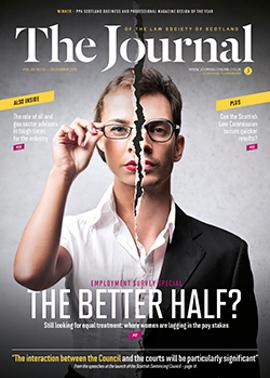There ought to be a law

The Abusive Behaviour and Sexual Harm (Scotland) Bill is currently making its way through the Scottish Parliament. Evidence was taken by the Justice Committee on 17 November and the Law Society of Scotland was invited to make representations.
A number of provisions gave cause for concern and prompted the Society's Criminal Law Committee to consider whether there has already been enough recent legislative change in this area.
There is provision in the bill for a new domestic abuse “aggravation”, which the Scottish Government advises us will draw attention to the fact that society does not condone domestic abuse. Can anyone be under that misapprehension, given the amount of recent legislation on this subject, with the new statutory offences of threatening and abusive behaviour, and stalking, to name but two?
Tackling revenge porn
In the bill, the Government also seeks to tackle the growing problem of what the tabloids like to call “revenge porn”. The posting online of intimate images of someone with whom you either have, or have had, an intimate relationship, or the threat to do so, will now have its own special offence, an addition to those already at the Crown’s disposal such as abusive or threatening behaviour or blackmail. The Government hopes that this will draw attention to such behaviour and confirm to anyone who may have been in doubt that it is criminal.
As the bill currently stands, it is necessary to show either an intention to cause distress or recklessness as to whether distress would be caused – we have suggested looking to recent legislation in England & Wales which is clear on the role of intention in such cases.
Along with the Faculty of Advocates, the Society expressed concerns that this may criminalise young people who acted perhaps through stupidity or naivety, rather than those who had criminal intent. A whole category of young people could be criminalised, with consequences that could follow them throughout their adult life.
Harassment: the mental element
The Scottish Government has also turned its attention to the issue of the harassment of partners and former partners where the perpetrator of the act or acts is either mentally ill or suffers from learning disability. The suggestion in the bill is that non-harassment orders should be made available in situations where an accused has been found either not guilty by reason of insanity, or unfit to stand trial. Failure to abide by the order will be a crime punishable in a number of ways including, presumably, imprisonment.
Considerable concern was expressed by the Society at the idea of criminalising those who lack the mental capacity to understand the consequences of their actions or, indeed, who were not in a position to participate in the trial process. Either situation would quite possibly result in a rather “Alice in Wonderland” return to the original position, i.e. no finding of guilt and no sentence imposed.
The problem of controlling the unacceptable behaviour of those lacking capacity to stand trial is a real one; however, we are of the view that it is one that is best considered within the forum of mental health legislation.
Proper directions?
The Scottish Government has also, in this bill, turned its attention once more to how to increase the conviction rates for rape and related sexual offences. The suggestion here, at s 6, is to have mandatory directions for the jury. These directions are twofold: the jury will be told that a delay in reporting a rape is not necessarily supportive of the suggestion that the complainer is lying; and that a lack of injury is, equally, not necessarily supportive of the defence position.
In our written response, the Society argued against such directions, stating that the Crown should properly continue to do as it has done, and lead evidence in general terms from a psychologist. The jury could then consider that evidence and weigh it up along with the other evidence in the case. In other words, the jury could continue to be masters of fact, leaving the law to the judge.
In this issue
- Dealing with mistakes as a trainee solicitor
- Landlords: police or prisoners?
- The evolving duty of trust and confidence
- The nobile officium: still relevant, still useful
- Reading for pleasure
- Opinion: Davinia Cowden
- Book reviews
- Profile
- President's column
- One year on
- People on the move
- Equal with whom?
- Sentences by the book
- Weathering the storm
- Law reform: securing a result
- There ought to be a law
- Reform in the air
- Taking a stand against slavery
- Where the bill falls short
- IP disputes and the corporate veil
- Bar reports no more
- Dutee Chand – a marathon for a sprinter
- Scottish Solicitors Discipline Tribunal
- Advance notices and letters of obligation
- Another school round for YFIL
- Aileen takes up key membership role
- Criminal practice note alert
- Law reform roundup
- My time for nothing
- Mentoring: the neighbour principle
- Magic bullets
- Recognising paralegals
- Commission on a mission
- Ask Ash
- You had your say






